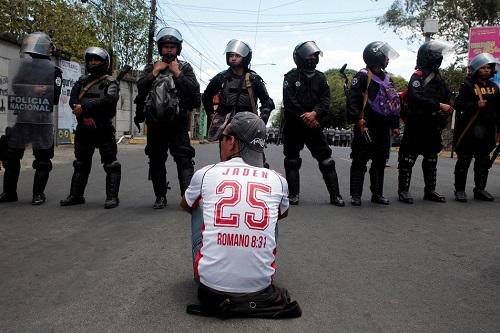Reuters photo
By
OHCHR
It has now been three months since demonstrations began in Nicaragua, initially against planned pension reforms but which have evolved into protests against President Daniel Ortega’s government.
The violence that has to date left an estimated 280 people dead and 1,830 injured has been overwhelmingly perpetrated by the State and by pro-government armed elements. Those killed include at least 19 police officers.
Police, armed elements and other violent groups have carried out so-called “clean-up operations” in different parts of the country, forcibly removing barricades erected by demonstrators and local communities. At least 12 people were killed over the weekend, including two when shots were fired at the Divina Misericordia Church in Managua where student demonstrators had sought refuge after the university premises they had been occupying came under attack.
The violence is all more horrific as armed elements loyal to the government are operating with the active or tacit support of and in coordination with the police and other state authorities. UN Human Rights Office staff on the ground report that a wide range of human rights violations are being committed, including extrajudicial killings, torture, arbitrary detentions, and denying people the right to freedom of expression. There has been incitement to hatred and smear campaigns, including against human rights defenders. The backdrop for all these violations is the absence of rule of law and due process.
We are extremely concerned that two human rights defenders, Medardo Mairena and Pedro Mena, could be victims of enforced disappearance. Police detained them on Friday at Managua airport and since then the authorities have not informed their families as to where they are, despite judicial requests. We call on the Nicaraguan authorities to provide immediate information on their whereabouts, and allow us and other human rights organisations access to all prisons and other detention facilities where those detained are believed to be held.
We are observing an emerging and disturbing practice of human rights defenders and people who have merely taken part in protests being criminalized. For example, the police publicly accused Medardo Mairena of the murder of several officers and branded him a “terrorist”. On Monday, the Nicaraguan Congress adopted a law on money-laundering and terrorism, with a very broad definition of terrorism, which raises concerns that it could be used against people taking part in protests.
Amid the increasing climate of fear and mistrust, there are growing concerns that violence will intensify as Nicaragua prepares to mark Liberation Day on Thursday, 19 July, in commemoration of the overthrow of the Somoza regime in 1979 by the Sandinistas.
The appalling loss of life must stop – now. It is imperative that the Nicaraguan State, which has obligations under international human rights law to guarantee the right to life and security of the population, as well as the rights to freedom of expression and peaceful assembly, and takes concrete steps as soon as possible to end the crisis and find a peaceful solution.
OHCHR
The Office of the United Nations High Commissioner for Human Rights (OHCHR) represents the world’s commitment to universal ideals of human dignity. We have a unique mandate from the international community to promote and protect all human rights.



No Comments Yet!
You can be first to comment this post!